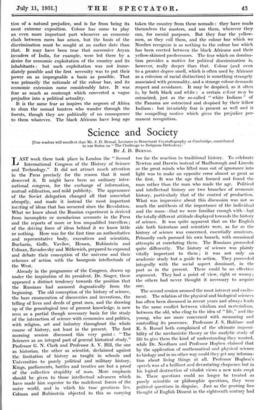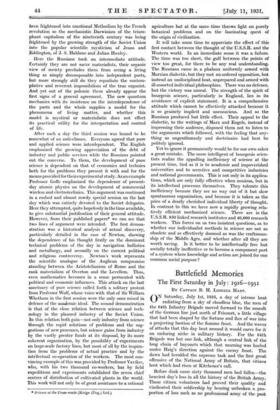Science and Society
[Our readers will recollect that Mr. J. D. Bernal, Lecturer in Structural Crystallography at Cambridge, contributed to our Series on " The Challenge to Religious Orthodoxy."
BY J. D. BERNAL LAST week there took place in London the " Seeond International Congress of the History of Science and Technology." It did not attract much attention in the Press precisely for the reason that it most deserved it. It might have been an ordinary inter- national congress, for the exchange of information, mutual edification, and mild publicity. The appearance of the Soviet delegation changed all that somewhat abruptly, and made it instead the most important Meeting of ideas that has occurred since the Revolution. What we know about the Russian experiment is derived from incomplete or mendacious accounts in the Press and the reports of more or less unqualified travellers ; of the driving force of ideas behind it we know little or nothing. Here was for the first time an authoritative and representative body, executives and scientists, Bucharin, Goffe, Vavilov, Hessen, Rubinstein and Colman, Zavadovsky and Mitkewich, prepared to expound and debate their conception of the universe and their schemes of action with the bourgeois intellectuals of the West.
Already in the programme of the Congress, drawn up under the inspiration of its president, Dr. Singer, there appeared a distinct tendency towards the position that the Russians had assumed dogmatically from the beginning. The old conception of the history of science, the bare enumeration of discoveries and inventions, the telling of lives and deeds of great men, and the drawing up of the genealogical tree of present knowledge, is now seen as a partial though necessary basis for the study of the interaction of science with economics and politics, with religion, art and industry throughout the whole course of history, not least in the present. The first morning session discussed this very point : "The Sciences as an integral part of general historical study." Professor G. N. Clark and Professor A. V. Hill, the one as historian, the other as scientist, declaimed against the limitation of history as taught in schools and Universities to purely political and military history. Kings, parliaments, battles and treaties are but a proof of the collective stupidity of man. More emphasis should be given to those intellectual advances which have made him superior to the maleficent forces of the outer world, and in which his true greatness lies. _Colman and Rubinstein objected . to. this as carrying too far the reaction to traditional history. To celebrate Newton and Darwin instead of Marlborough and Lincoln as the great minds who lifted man out of ignorance into light was to make an opposite error almost as great as the first. It was the age that formed and found the man rather than the man who made the age. Political and intellectual history are two branches of economic history, particularly that of the control of produCtion. What was impressive about this discussion was not so much the antithesis of the importance of the individual and the mass—that we were familiar enough with—but the totally different attitude displayed towards the history of science. It was quite apparent that on the English side both historians and scientists were, as far as the history of science was concerned, essentially amateurs. Primarily each pursued his own branch, with occasional attempts at correlating them. The Russians proceeded quite differently. The history of science was plainly vitally important to them ; it was not only an academic study but a guide to action. They proceeded integrally with the social aspect dominant, in the past as in the present. There could be no effective argument. They had a point of view, right or wrong ; the others had never thought it necessary to acquire one.
The second session aroused the most interest and excite- ment. The relation of the physical and biological sciences has often been discussed in recent years and always leads to the same conflict between vitalism and materialism, between the old, who cling to the idea of " life," and the young, who are more concerned with measuring and controlling its processes. Professors J. S. Haldane and E. S. Russel both complained of the ultimate impossi- bility of the mechanistic theory or the analytic study of life to give them the kind of understanding they wanted, while Dr. Needham and Professor Hogben claimed that by the application of mathematical and physical science to biology and in no other way could they get any informa- tion about living things at all. Professor Hogben's speech was of a brilliant and devastating eloquence but in his logical destruction of vitalist views a new note crept in. These questions could no longer be treated as purely scientific or philosophic questions, they were political questions in disguise. Just as the growing free thought of English Dissent in the eighteenth century had been frightened into emotional Methodism by the French revolution so the mechanistic Darwinism of the trium- phant capitalism of the nineteenth century was being frightened by the growing strength of the Soviet Union into the popular scientific mysticism of Jeans and Eddington, of J. S. Haldane and Julian Huxley.
. Here the Russians took an intermediate attitude. Certainly they are not naïve materialists, their organic view of society precludes them from seeing a living thing as simply decomposable into independent parts, but more strongly still do they repudiate the contem- plative and reverent impossibilism of the true organist. And yet out of the polemic there already appear the first signs of a general agreement. The new quantum mechanics with its insistence on the interdependence of the parts and the whole supplies a model for the phenomena of living matter, and whether this model is mystical or materialistic does not effect its practical utility for the interpretation and control of life.
After such a day the third session was bound to be somewhat of an anti-climax. Everyone agreed that pure and applied science were interdependent. The English emphasized the growing appreciation of the debt of industry and public services while the Russians pointed out the converse. To them, the development of pure science is dependent on that of economics and technics both for the problems they present it with and for the means provided for their experimental study. As an example Professor Goffe emphasized the dependence of present- day atomic physics on the development of commercial wireless and electrotechnics. This argument was continued in a rushed and almost rowdy special session on the last day which was entirely devoted to the Soviet delegates. Here they attempted, quite hopelessly in the time available, to give substantial justification of their general attitude. However, from their published papers* we can see that two lines of argument were intended. The first demon- stration was a historical analysis of actual discovery, particularly detailed in the case of Newton, showing the dependence of his thought firstly on the dominant technical problems of the day in navigation ballistics and metallurgy, and secondly on the current political and religious controversy. Newton's work represents the scientific analogue of the Anglican compromise standing between the Aristotelianism of Rome and the rank materialism of Overton and the Levellers. Thus, even mathematics becomes in a sense permeated with political and economic influences. This attack on the last sanctuary of pure science called forth a solitary protest from Professor Wolf, whose voice with that of Sir William Whetham in the first session were the only ones raised in defence of the academic ideal. The second demonstration is that of the close relation between science and tech- nology in the planned industry of the Soviet Union. In this relation both gain—not only industry from science through the rapid solutions of problems and the sug- gestions of new processes, but science gains from industry by the vastly greater funds at its disposal, by its more coherent organization, by the possibility of experiments on large-scale factory lines, but most of all by the inspira- tion from the problems of actual practice and by the intellectual co-operation of the workers. The most con- vincing example of this was provided by Professor Vavilov, who, with his two thousand co-workers, has by field expeditions and experiments established the seven chief centres of distribution of cultivated plants in the world. This work will not only be of great assistance to a rational * Science at the Crosa-roade (Kniga (Eng.) Ltd.) agriculture but at the same time throws light on purely botanical problems and on the fascinating quest of the origin of civilization.
It will take some time to appreciate the effect of this first contact between the thought of the U.S.S.R. and the Western world. In an immediate sense it was a failure. The time was too short, the gulf between the points of view too great, for there to be any real understanding. The Russians came in a phalanx uniformly armed with Mandan dialectic, but they met no ordered opposition, but instead an undisciplined host, unprepared and armed with ill-assorted individual philosophies. There was no defence, but the victory was unreal. The strength of the spirit of bourgeois science, particularly in England, lies in its avoidance of explicit statement. It is a comprehensive attitude which cannot be effectively attacked because it is so geuinely implicit and unconscious. And so the Russians produced but little effect. Their appeal to the dialectic, to the writings of Marx and Engels, instead of impressing their audience, disposed them not to listen to the arguments which followed, with the feeling that any- thing so ungentlemanly and doctrinaire had best be politely ignored.
Yet to ignore it permanently would be for our own sakes a great mistake. The more intelligent of bourgeois scien- tists realize the appalling inefficiency of science at the present time, tied as it is to academic and impoverished universities and to secretive and competitive industries and national governments. This is not only in its applica- tions, which are only fully effective when noxious, but in its intellectual processes themselves. They tolerate this inefficiency because they see no way out of it but slow spontaneous organization, and because it is taken as the price of a dearly cherished individual liberty of thought. In contrast to this we have now a rapidly growing rela- tively efficient mechanized science. There are in the U.S.S.R. 850 linked research institutes and 40,000 research workers. This forces on us two insistent questions, as to whether our individualist methods in science are not as obsolete and as effectively doomed as was the craftsman- ship of the Middle Ages, and whether after all they are worth saving. Is it better to be intellectually free but socially totally ineffective or to become a component part of a system where knowledge and action are joined for one common social purpose ?



































 Previous page
Previous page